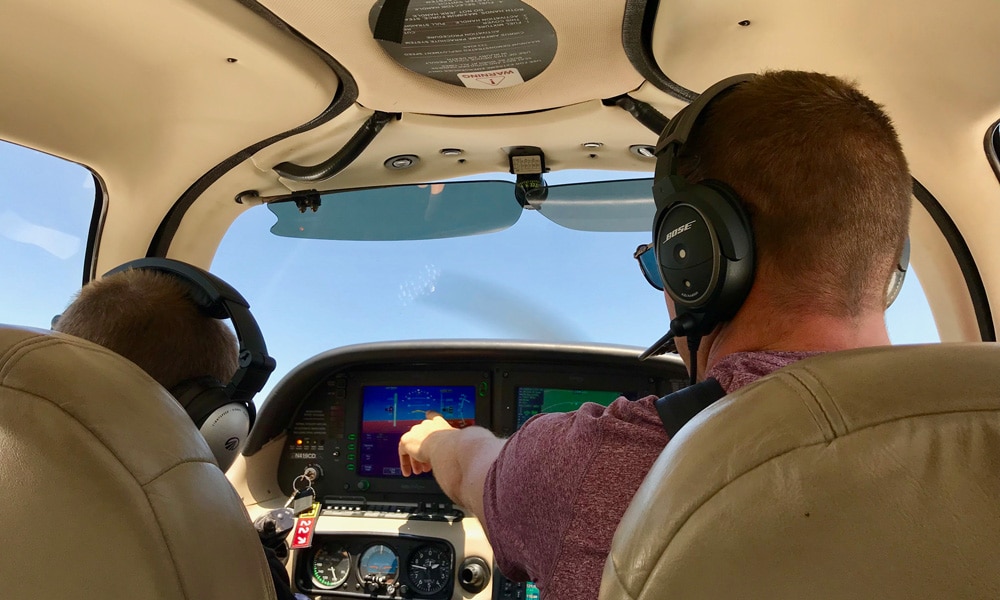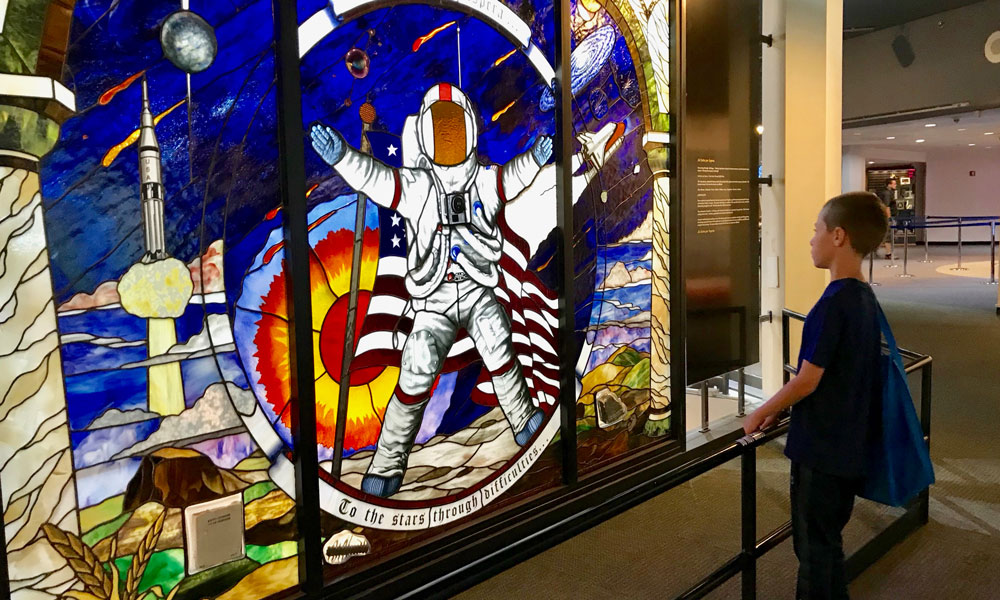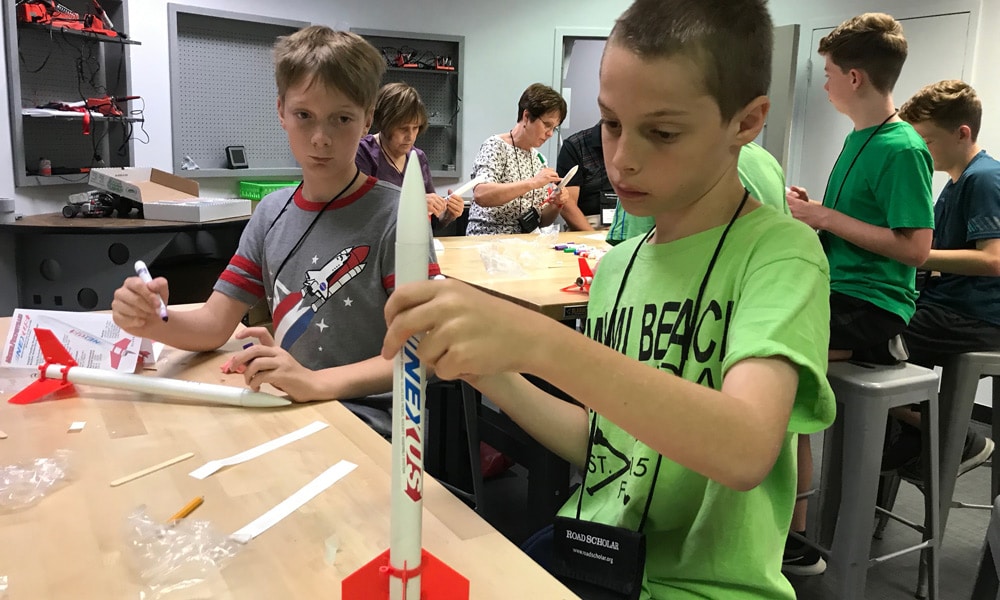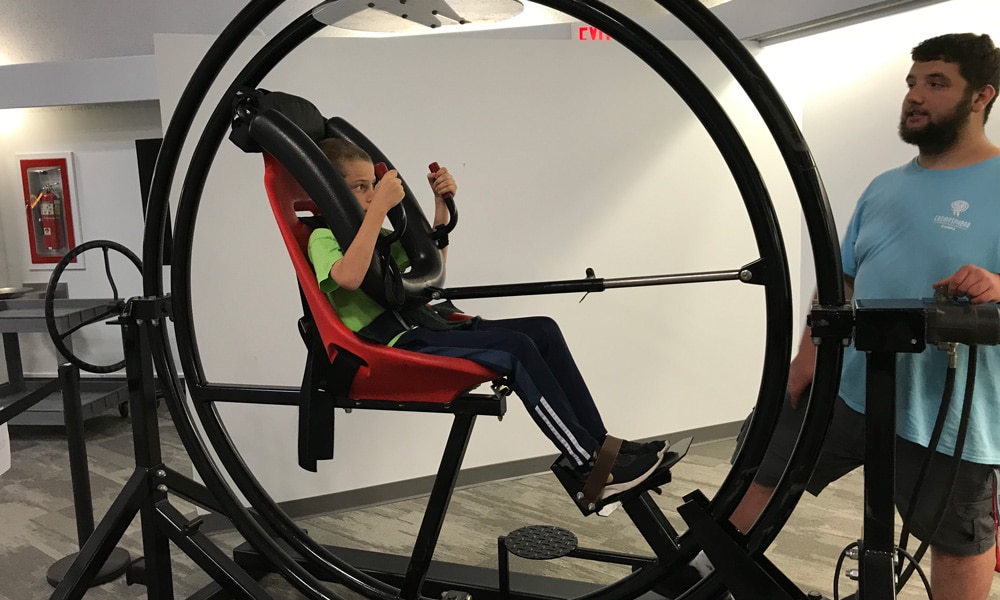
Piloting a small plane with the Road Scholar aviation program. Photo by Veronica Stoddart
“Let’s do it again!” squeals my 12-year-old grandson, Caleb, through the headphones of our Cirrus single-engine four-seat aircraft. Seated next to our pilot, Caleb has just experienced the thrill of flying first hand. “It was way more fun than I thought,” he admits, after being extremely nervous about trying it. “I actually got to take off myself,” he gushes of his time at the co-pilot’s controls.
Overcoming fears and learning new skills — along with having loads of fun in the process — is what our five-day Road Scholar program for grandparents and grandkids is all about.
When I invited Caleb on a trip for the two of us, he picked this tour, “Aviation Adventures & Space Exploration With Your Grandchild,” out of a whopping 161 “grandparent” options offered by non-profit Road Scholar, the world’s largest educational travel organization for adults. With something for nearly every interest and age group, they range from rafting the Grand Canyon to cooking in Santa Fe to an African safari. The fully planned itineraries include activities, ground transportation, meals, accommodations and expert instruction. As such, they perfectly solve my challenge of how to spend each vacation day with Caleb — especially helpful since we live in different cities and are not used to being alone with together.
Based in the Wichita, Kansas, area — known as the “Air Capital of the World” because it produces almost half of the world’s general aviation planes — this Road Scholar adventure for 10-14-year-olds is like aviation summer camp. A wonderful way for us to have a special vacation together, it gives me precious one-on-one time with Caleb, as well as peer interaction for both of us. Plus, it gets him off his ubiquitous digital devices — a triumph in itself!
Turns out that traveling with my grandchild is also a growing trend. Called “skip-generation” travel, it leaves the middle generation, the parents, behind so grandparents can bond with their grandkids and create special memories. “It’s an opportunity to learn together and then you can talk about it,” says participant Marsha Tenwinkel of New Berlin, Wisc., who’s on her third Road Scholar grandparent trip. “It’s special to watch Jack (age 10) get so excited about the different activities.”

Checking out the space-themed artwork. Photo by Veronica Stoddart
Immersive Experiences
What activities they are! Our packed itinerary features interactive experiences you simply couldn’t duplicate on your own, all under the guidance of group leader Michelle Snyder and a few enthusiastic counselors. Our program is based at the Cosmosphere, a 105,000-square-foot space and science education center in the town of Hutchinson near Wichita. In addition to a world-class space museum — affiliated with the Smithsonian’s National Air & Space Museum — the facility boasts a planetarium, exhibit galleries, classrooms, labs and one of the first-ever IMAX Dome theaters.
It also features the coolest simulation experiences designed to prepare kids for all aspects of aviation — from design, engineering and technology to flight and space travel. Caleb and his 14 cohorts have a blast trying them all: A computer flight simulator that prepares them to pilot the real thing. A multi-access trainer that spins on all axes of flight (“a bit more scary than I thought,” says Caleb, upon exiting the apparatus). A stress simulator that duplicates a space capsule’s motion. A 4-G centrifuge that accelerates until reaching four times the force of gravity (“so cool!” proclaims Caleb). And a simulated NASA space capsule.
They also play with a 3-D zSpace computer program that combines augmented and virtual reality for multi-sensory learning. They try on the top half of a real 180-lb. spacesuit that has Caleb reeling. They build their own Lego robots controlled by iPads and compete in a “battle of the bots.” And they measure their weight in space: Caleb’s would be 1,700 lbs. on the sun, 170 lbs. on Jupiter, 22 lbs. on Mars and 9 lbs. on the moon.

Building model rockers with grandparents. Photo by Veronica Stoddart
Grandparents and Grandkids Together
A few experiences are designed for our entire group of 33 to enjoy. We construct model rockets and launch them into the air on a grassy field — to much fanfare. Yes, they all work! We do a NASA moon base survival exercise to determine which of 15 items will help a stranded team on the moon rendezvous with its mother ship 200 miles away. We learn that a stellar map is more useful than a magnetic compass (useless on a moon without poles) and that nylon rope (helpful to navigate the moon’s cliffs and craters) is more useful than a box of matches (useless without oxygen).
The program’s culmination, for which we train over three days, is the simulated Falcon Shuttle mission. Breaking out into teams of five inside a simulated cockpit with its daunting control panels, grandparents and grandkids launch a Falcon Shuttle into space, deliver a payload, return to Earth and land, while watching the thrilling view outside its windows. We follow a 16-page mission checklist with call-and-response instructions for each team member — pilot, commander, mission specialist, payload commander and payload specialist. It’s a high-pressure exercise, timed to the second, but it delivers a huge payoff in sense of accomplishment as pilot Caleb’s beaming face attests.

Preparing for space. Photo by Veronica Stoddart
Learning is Fun
But wait, there’s more. We enjoy presentations on the forces of flight and the history of rocketry. We learn how astronauts live in space, including the effects of microgravity (neck muscles aren’t needed to hold up the head so astronauts must exercise to maintain muscle mass) and how they eat (M&Ms are their favorite candy), pass waste and bathe, which we all find fascinating. We also watch a planetarium show and two films on space travel. And we tour the nearby Beechcraft factory and the Kansas Aviation Museum, where we marvel at the inside of a B-52 bomb bay.
“Road Scholar programs are so well organized,” says Paul Franklin from Charleston, S.C., who’s on his second grandparent trip with Graham, 14. “You meet interesting people and learn a lot.” Like the fact that fruit flies were the first animals in space (who knew?) and that 12 people have been to the moon. Or that it took some 400,000 people to support the Apollo 11 lunar mission 50 years ago. Or that there are 15,000 astrologists in the U.S., but only 3,500 astronomers.
“We’ve learned a lot,” confirms Evan Marshall, 12, from Columbia, Mo., “mostly how to do things I’m not comfortable with, like the centrifuge or flying, which was scary. It feels like you could crash. But afterward you feel like, ‘I did it!’”
Susan Goodreds of Delray Beach, Fla., who’s on her fifth grandparent trip, raves about the experience. “Just to watch them expand their view of the world is special,” she says. Plus, “I heard more from my grandson in the past few days than in his whole life. That’s been the real jewel of the trip.”
Nine-year-old Carter Dziuban, from Pasadena, Md., probably sums it up best. When asked what he liked most, he replies, without missing a beat: “Everything!”

